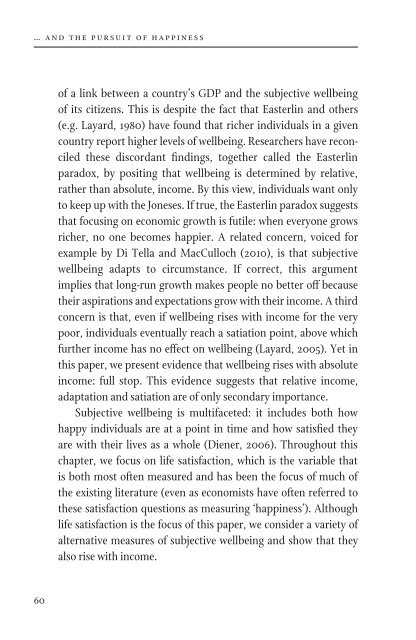… and the Pursuit of Happiness - Institute of Economic Affairs
… and the Pursuit of Happiness - Institute of Economic Affairs
… and the Pursuit of Happiness - Institute of Economic Affairs
You also want an ePaper? Increase the reach of your titles
YUMPU automatically turns print PDFs into web optimized ePapers that Google loves.
<strong>…</strong> <strong>and</strong> <strong>the</strong> pursuit <strong>of</strong> happiness<br />
subjective wellbeing<br />
<strong>of</strong> a link between a country’s GDP <strong>and</strong> <strong>the</strong> subjective wellbeing<br />
<strong>of</strong> its citizens. This is despite <strong>the</strong> fact that Easterlin <strong>and</strong> o<strong>the</strong>rs<br />
(e.g. Layard, 1980) have found that richer individuals in a given<br />
country report higher levels <strong>of</strong> wellbeing. Researchers have reconciled<br />
<strong>the</strong>se discordant findings, toge<strong>the</strong>r called <strong>the</strong> Easterlin<br />
paradox, by positing that wellbeing is determined by relative,<br />
ra<strong>the</strong>r than absolute, income. By this view, individuals want only<br />
to keep up with <strong>the</strong> Joneses. If true, <strong>the</strong> Easterlin paradox suggests<br />
that focusing on economic growth is futile: when everyone grows<br />
richer, no one becomes happier. A related concern, voiced for<br />
example by Di Tella <strong>and</strong> MacCulloch (2010), is that subject ive<br />
wellbeing adapts to circumstance. If correct, this argument<br />
implies that long-run growth makes people no better <strong>of</strong>f because<br />
<strong>the</strong>ir aspirations <strong>and</strong> expectations grow with <strong>the</strong>ir income. A third<br />
concern is that, even if wellbeing rises with income for <strong>the</strong> very<br />
poor, individuals eventually reach a satiation point, above which<br />
fur<strong>the</strong>r income has no effect on wellbeing (Layard, 2005). Yet in<br />
this paper, we present evidence that wellbeing rises with absolute<br />
income: full stop. This evidence suggests that relative income,<br />
adaptation <strong>and</strong> satiation are <strong>of</strong> only secondary importance.<br />
Subjective wellbeing is multifaceted: it includes both how<br />
happy individuals are at a point in time <strong>and</strong> how satisfied <strong>the</strong>y<br />
are with <strong>the</strong>ir lives as a whole (Diener, 2006). Throughout this<br />
chapter, we focus on life satisfaction, which is <strong>the</strong> variable that<br />
is both most <strong>of</strong>ten measured <strong>and</strong> has been <strong>the</strong> focus <strong>of</strong> much <strong>of</strong><br />
<strong>the</strong> existing literature (even as economists have <strong>of</strong>ten referred to<br />
<strong>the</strong>se satisfaction questions as measuring ‘happiness’). Although<br />
life satisfaction is <strong>the</strong> focus <strong>of</strong> this paper, we consider a variety <strong>of</strong><br />
alternative measures <strong>of</strong> subjective wellbeing <strong>and</strong> show that <strong>the</strong>y<br />
also rise with income.<br />
Main findings<br />
Our first finding is that richer individuals are more satisfied with<br />
<strong>the</strong>ir lives, <strong>and</strong> that this finding holds across 140 countries, <strong>and</strong><br />
several data sets. Across each <strong>of</strong> <strong>the</strong>se countries, <strong>the</strong> relationship<br />
between income <strong>and</strong> satisfaction is remarkably similar. Our<br />
graphical analysis suggests that subjective wellbeing rises with<br />
<strong>the</strong> log <strong>of</strong> income. This functional form implies that a 20 per cent<br />
rise in income has <strong>the</strong> same impact on wellbeing regardless <strong>of</strong> <strong>the</strong><br />
initial level <strong>of</strong> income: going from $500 to $600 <strong>of</strong> income per<br />
year yields <strong>the</strong> same impact on wellbeing as going from $50,000<br />
to $60,000. This specification is appealing on <strong>the</strong>oretical grounds<br />
because a st<strong>and</strong>ard assumption in economics is that <strong>the</strong> marginal<br />
impact <strong>of</strong> a dollar <strong>of</strong> income diminishes as income increases.<br />
We <strong>the</strong>n look at cross-country evidence. Using larger data<br />
sets than previous authors have examined, we find an economically<br />
<strong>and</strong> statistically significant relationship between average<br />
levels <strong>of</strong> satisfaction in a country <strong>and</strong> <strong>the</strong> log <strong>of</strong> GDP per capita.<br />
The data also show no evidence <strong>of</strong> a satiation point. Whereas Easterlin<br />
(1974) had argued that <strong>the</strong> relationship between wellbeing<br />
<strong>and</strong> income seen within countries was stronger than <strong>the</strong> relationship<br />
seen between countries, <strong>and</strong> that this provided evidence for<br />
<strong>the</strong> importance <strong>of</strong> relative income, our evidence undermines <strong>the</strong><br />
empirical foundation for this claim.<br />
Time-series evidence is <strong>the</strong>n examined. While <strong>the</strong> withincountry<br />
<strong>and</strong> between-country comparisons cast doubt on <strong>the</strong> Easterlin<br />
paradox, <strong>the</strong>y do not by <strong>the</strong>mselves tell us whe<strong>the</strong>r economic<br />
growth in fact translates into gains in subjective wellbeing. This<br />
question has challenged researchers for some time because <strong>of</strong> a<br />
lack <strong>of</strong> consistent time-series data on subjective wellbeing. We<br />
analyse <strong>the</strong> time-series movements in subjective wellbeing using<br />
60 61












